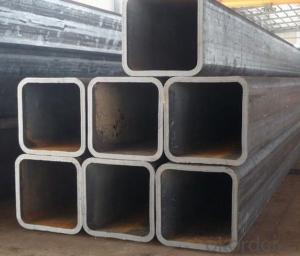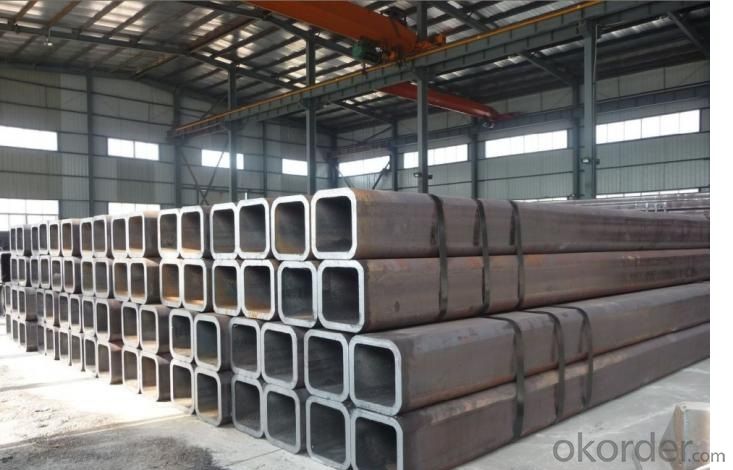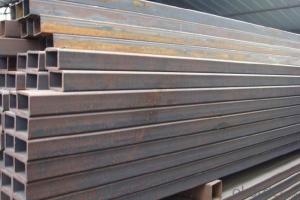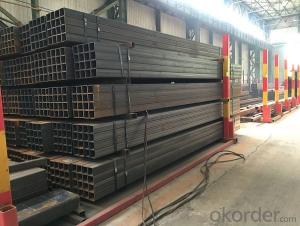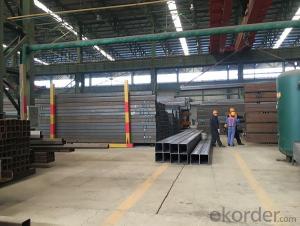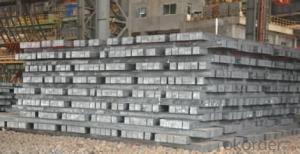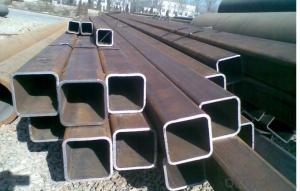Steel Pipe --Various Standard Rectangular Steel Pipe
- Loading Port:
- Tianjin
- Payment Terms:
- TT OR LC
- Min Order Qty:
- 25 m.t.
- Supply Capability:
- 8000 m.t./month
OKorder Service Pledge
OKorder Financial Service
You Might Also Like
1、Structure of Rectangular Steel Pipe API SPEC 5CT:
Rectangular Steel Pipe is to be used for conveying gas, water, and petroleum foroil and natural gas industries. And used for structural steel pies purpose. As the manufacturing process does not include any welding, Rectangular Steel Pipe are perceived to be stronger and more reliable. Historically Rectangular Steel Pipe was regarded as withstanding pressure better than other types, and was often more easily available than welded pipe.
2、Main Features of Rectangular Steel Pipe API SPEC 5CT:
• High manufacturing accuracy
• High strength
• Small inertia resistance
• Strong heat dissipation ability
• Good visual effect
• Reasonable price
3、Rectangular Steel Pipe API SPEC 5CT: Specification:
Standard | GB, DIN, ASTM ASTM A106-2006, ASTM A53-2007 |
Grade | 10#-45#, 16Mn 10#, 20#, 45#, 16Mn |
Thickness | 8 - 33 mm |
Section Shape | Round |
Outer Diameter | 133 - 219 mm |
Place of Origin | Shandong, China (Mainland) |
Secondary Or Not | Non-secondary |
Application | Hydraulic Pipe |
Technique | Cold Drawn |
Certification | API |
Surface Treatment | factory state or painted black |
Special Pipe | API Pipe |
Alloy Or Not | Non-alloy |
Length | 5-12M |
Outer Diameter | 21.3-610mm |
Grade | 20#, 45#, Q345, API J55, API K55, API L80, API N80, API P110, A53B |
Standard | ASME, ASTM |
1) Material:20#(ASTM A 106/A53 GRB.API5LGRB,GB),45#,16Mn,10#.
2) Specification range:OD:21.3-610mm,WT:6-70mm,length:6-12m or according to the requirement of clients.
3) Excutive standards:GB,ASME API5L.ASTM A 106/A53,Despite of the above standards,we can also supply seamless steel pipe with standard of DIN,JIS,and so on,and also develop new products according to the requirements of our clients!
4) Surface:black lacquered,varnish coating or galvanized.
5) Ends:Beveled or square cut,plastic capped,painted.
6) Packing:bundles wrapped with strong steel strip,seaworthy packing.
4、Packaging & Delivery
Packaging Details: | seaworthy package,bundles wrapped with strong steel strip |
Delivery Detail: | 15-30days after received 30%TT |
5、FAQ of Rectangular Steel Pipe API SPEC 5CT:
①How is the quality of your products?
Our products are manufactured strictly according to national and internaional standard, and we take a test
on every pipe before delivered out. If you want see our quality certifications and all kinds of testing report, please just ask us for it.
Guaranteed: If products’ quality don’t accord to discription as we give or the promise before you place order, we promise 100% refund.
②How about price?
Yes, we are factory and be able to give you lowest price below market one, and we have a policy that “ for saving time and absolutely honest business attitude, we quote as lowest as possible for any customer, and discount can be given according to quantity”,if you like bargain and factory price is not low enough as you think, just don’t waste your time.Please trust the quotation we would give you, it is professional one.
③Why should you chose us?
Chose happens because of quality, then price, We can give you both.Additionally, we can also offer professional products inquiry, products knowledge train(for agents), smooth goods delivery, exellent customer solution proposals.Our service formula: good quality+good price+good service=customer’s trust
SGS test is available, customer inspection before shipping is welcome, third party inspection is no problem.
6、 Rectangular Steel Pipe API SPEC 5CT: Images:
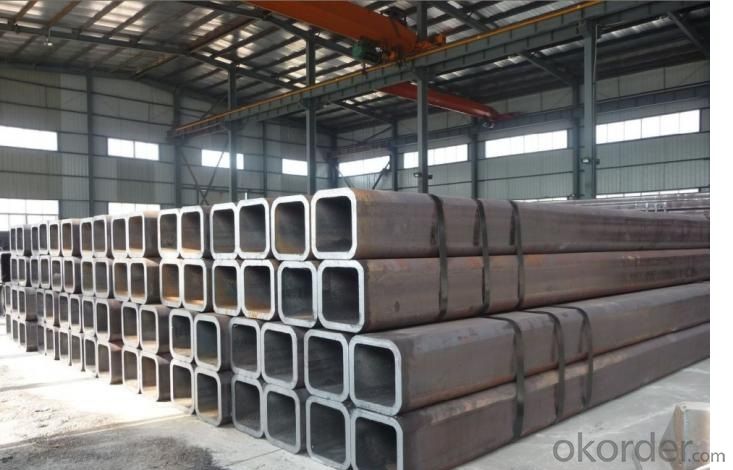
- Q: Can steel pipes be used for underground stormwater drainage?
- Indeed, underground stormwater drainage can utilize steel pipes. These pipes possess durability and boast a high strength-to-weight ratio, rendering them appropriate for subterranean usage. They can endure substantial burdens and fend off corrosion, thus guaranteeing sustained effectiveness within stormwater drainage systems. Furthermore, steel pipes lend themselves to easy welding, facilitating customization and flexibility during both design and installation. Nonetheless, it is imperative to implement adequate corrosion protection measures, such as the application of a protective coating or the utilization of corrosion-resistant alloys, to avert degradation over time. Regular maintenance and monitoring are also advisable to uphold the pipes' integrity and ensure optimal stormwater drainage functionality.
- Q: What does GALV mean in a steel tube?
- Steel pipe is not only used to transport fluid and powder solid, exchange heat energy, and manufacture mechanical parts and containers, but also is an economic steel. It can reduce weight and save 20 to 40% of metal by using steel pipe to make building structure, network frame, prop and mechanical support. Moreover, it can realize factory mechanization construction. Using steel pipe to manufacture road bridge can not only save steel, simplify construction, but also greatly reduce the area of coating protective layer, save investment and maintenance cost.
- Q: How are steel pipes used in the construction of pipelines?
- Steel pipes are commonly used in the construction of pipelines due to their strength, durability, and resistance to corrosion. They are typically laid down and welded together to form a continuous pipeline that can transport various fluids, such as oil, gas, or water, over long distances. The steel pipes provide a reliable and efficient means of distribution, ensuring the safe and efficient transfer of resources in the construction industry.
- Q: What are the common applications of steel pipes in construction?
- Steel pipes are commonly used in construction for various applications such as structural supports, plumbing systems, gas and water distribution, and underground utilities. They provide strength, durability, and resistance to corrosion, making them suitable for both above-ground and underground installations.
- Q: How do you clean and maintain steel pipes?
- To clean and maintain steel pipes, start by removing any loose dirt or debris using a brush or cloth. Then, use a mild detergent or soap solution to wash the pipes thoroughly. Rinse them with clean water and dry them with a soft cloth to prevent water spots. To maintain them, regularly inspect for signs of corrosion or rust and address any issues promptly. Additionally, apply a protective coating or paint to prevent future rusting.
- Q: What are the different types of steel pipe connections for steam pipelines?
- There are several types of steel pipe connections commonly used for steam pipelines, including threaded connections, flanged connections, welded connections, and grooved connections. Each type has its own advantages and is selected based on factors such as the pipe size, pressure rating, and ease of installation and maintenance.
- Q: What does cathodic protection of steel tubes mean?
- There are two ways of cathodic protection: sacrificial anode, cathodic protection and impressed current cathodic protection.Sacrificial anode: connect a living metal or alloy to a protective metal to form a galvanic cell. The active metal replaces the protected metal to lose electrons so that the protected metal is not corroded.
- Q: Can steel pipes be used for conveying oil?
- Steel pipes are suitable for the transportation of oil. In the oil and gas industry, steel pipes are widely utilized for the conveyance of oil due to their robustness, longevity, and resistance to corrosion. The exceptional strength of steel pipes enables them to endure the demanding conditions of high pressure and temperature that often accompany oil transportation. Furthermore, steel pipes are less susceptible to leakage and damage in comparison to alternative materials, thus making them a dependable choice for the efficient transfer of oil over extensive distances. Moreover, the sleek interior surface of steel pipes aids in reducing friction and improving the oil flow. Overall, steel pipes are the preferred option for oil transportation owing to their superior mechanical properties and enduring performance.
- Q: How are steel pipes classified based on their thickness?
- There are three main categories for classifying steel pipes based on their thickness: Schedule, Nominal Pipe Size (NPS), and Wall Thickness. In North America, the Schedule classification is commonly used and refers to the pipe's wall thickness. It is indicated by numbers like Schedule 10, Schedule 40, and Schedule 80, where a higher number means a thicker pipe. On the other hand, the Nominal Pipe Size (NPS) classification is used internationally and refers to the pipe's inside diameter. It is expressed in inches and is usually followed by a schedule number to indicate the wall thickness. For example, NPS 6 Schedule 40 means a pipe with a 6-inch inside diameter and a wall thickness according to Schedule 40. Additionally, steel pipes can be classified based on their wall thickness in millimeters or inches. This classification provides a more precise measurement of the pipe's thickness and is commonly referred to as the "wall thickness" or "wt" in specifications. The wall thickness is measured from the outside diameter to the inside diameter and can be expressed in various units of measurement like millimeters, inches, or gauge. In summary, steel pipes are classified based on their thickness using different systems such as Schedule, Nominal Pipe Size (NPS), and Wall Thickness. These classifications ensure the selection of the appropriate pipe for specific applications, taking into account factors such as pressure requirements, structural integrity, and compatibility with other system components.
- Q: What does "buried steel pipe" 6*2SC100 mean?
- Welded steel pipe refers to the use of steel or steel plate bending deformation into a round, square and other shapes after welding into the surface of the joint of the steel pipe. The blank used in welded steel pipe is steel or strip steel.
Send your message to us
Steel Pipe --Various Standard Rectangular Steel Pipe
- Loading Port:
- Tianjin
- Payment Terms:
- TT OR LC
- Min Order Qty:
- 25 m.t.
- Supply Capability:
- 8000 m.t./month
OKorder Service Pledge
OKorder Financial Service
Similar products
Hot products
Hot Searches
Related keywords
